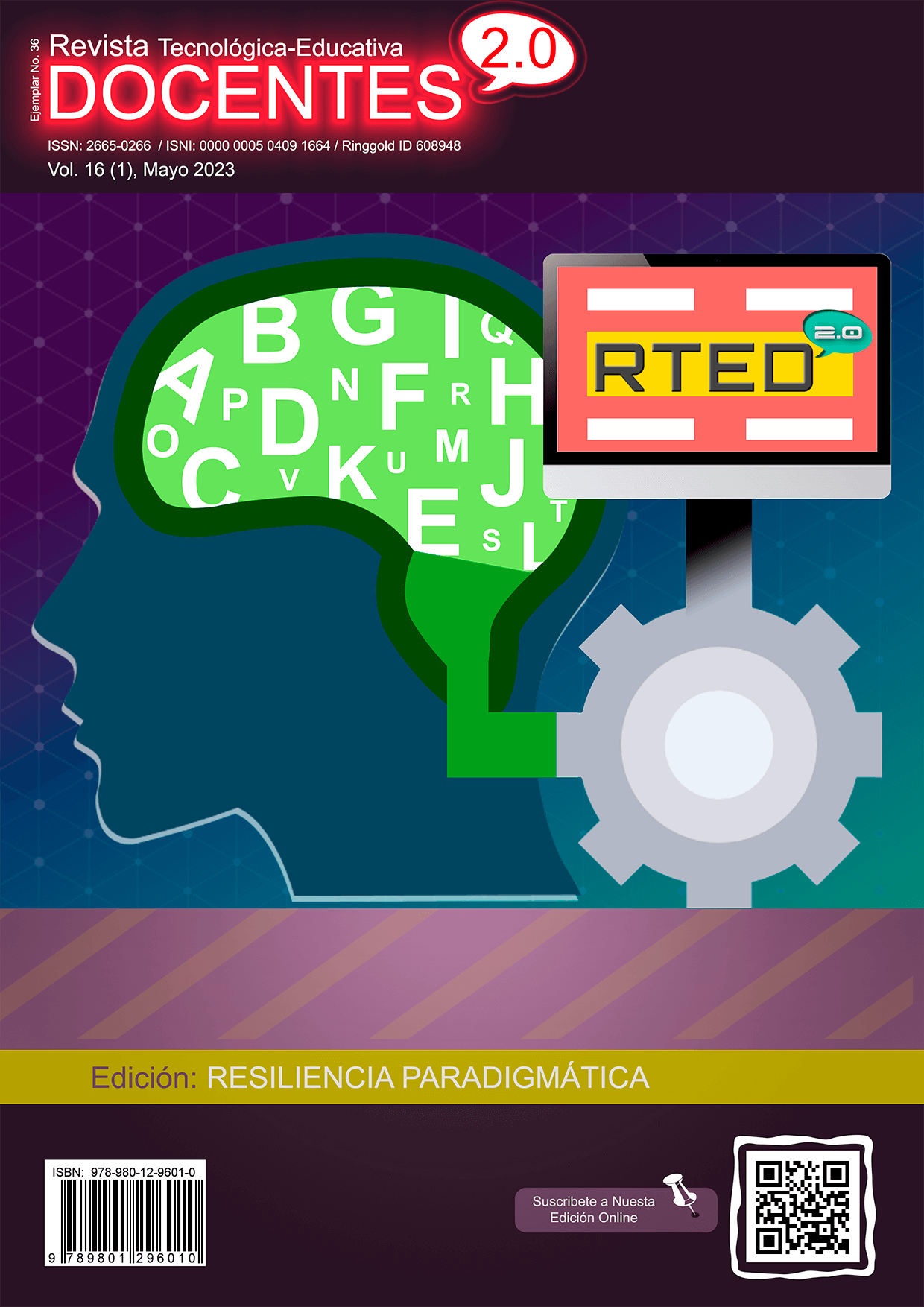Artificial Intelligence and the Context of Teaching in Mexico
 DOI:
https://doi.org/10.37843/rted.v16i1.336
DOI:
https://doi.org/10.37843/rted.v16i1.336
Main Article Content
Abstract
At present, the use of various information technologies has exceeded limits not seen before, promoting a restructuring based on its nature. The research aims to analyze the context of technologies based on artificial intelligence and its impact in the absence of legislative regulation in the country of Mexico within the teaching field. The research was based on the inductive method, humanist paradigm, topic narrative design, and exploratory documentary type with cross-section. For the research development, the Redalyc scientific information system, the SciELO repository, and the journal Institución de Investigaciones Jurídicas IIJ were considered, as well as the dissertation in development. The documentary research technique was applied, identifying electronic articles contained in the mentioned magazines. Subsequently, the results were identified by analyzing the content and theme to establish their consideration in the investigation. It was possible to observe that at the time present, there is not enough information on the subject. Therefore, it is necessary to consider the topic's relevance within the educational environment.
Downloads
Metrics
Article Details

This work is licensed under a Creative Commons Attribution-NonCommercial-NoDerivatives 4.0 International License.
Those authors who have publications in our journal accept the following terms:
- When a work is accepted for publication, the author retains rights of reproduction, distribution of his/her article for exploitation in all countries of the world in the format provided by our magazine and any other magnetic medium, optical, and digital.
- Authors will retain their copyright and guarantee the journal the right first to publish their work, which will be simultaneously subject to the Creative Commons Acknowledgment License (Attribution-NonCommercial-NoDerivatives 4.0 International (CC BY-NC-ND 4.0)). That allows third parties to copy and redistribute the material in any medium or format, under the following conditions: Acknowledgment - You must properly acknowledge authorship, provide a link to the license, and indicate if any changes have been made. You may do so in any reasonable way, but not in a way that suggests you have the licensor's endorsement or receive it for your use. NonCommercial - You may not use the material for a commercial purpose. NoDerivatives - If you remix, transform, or build from the material, you cannot broadcast the modified material. There are no additional restrictions - You cannot apply legal terms or technological measures that legally restrict you from doing what the license allows.
- Authors may adopt other non-exclusive license agreements to distribute the published version of the work (e.g., deposit it in an institutional archive or publish it in a monographic volume) provided that the initial publication in this journal is indicated.
- Authors are allowed and recommended to disseminate their work through the Internet (e.g., in institutional telematic archives, repositories, libraries, or their website), producing exciting exchanges and increasing the published work's citations.
- Request of withdrawal an article has to be done in writing by the author to the Editor, becoming effective after a written response from the Editor. For this purpose, the author or authors will send correspondence via e-mail: [email protected].
- The author will not receive financial compensation for the publication of his work.
- All Docentes 2.0 Journal publications are under the Open Journal System (OJS) platform at: https://ojs.docentes20.com/.
References
Aliseda, A. (2004). Sobre la lógica del descubrimiento científico de Popper. Signos Filosóficos. VI (11s), 115-130. https://www.redalyc.org/articulo.oa?id=34309908
Alvarado, L., & García, M. (2008). Características más relevantes del paradigma sociocrítico: su aplicación en investigaciones de educación ambiental y de enseñanza de las ciencias realizadas en el Doctorado de Educación del Instituto Pedagógico de Caracas. Sapiens. Revista Universitaria de Investigación. 9(2), 187-202. https://www.redalyc.org/articulo.oa?id=41011837011
Cáceres, E. (2006). Inteligencia artificial, derecho E-Justice (el Proyecto IIJ-Conacyt). Boletín Mexicano de Derecho Comparado, XXXIX (116), 593-611. https://www.redalyc.org/articulo.oa?id=42711612
Fernández-Fernández, A. (2021). La inteligencia artificial, las redes sociales y la protección de datos. https://revistas.juridicas.unam.mx/index.php/hechos-y-derechos/article/view/16369/17061
Guerrero, R. (2022). Aproximaciones de la inteligencia artificial y oportunidades de la protección de datos personales en el Derecho mexicano. Revista Praxis de la Justicia Fiscal y Administrativa, No. 32, Año22. https://www.tfja.gob.mx/investigaciones/pdf/r_32-trabajo-1.pdf
Hardy, T. (2001). IA Inteligencia Artificial. POLIS. Revista Latinoamericana. 1(2), 0. https://www.redalyc.org/articulo.oa?id=30500219
Mendoza, O. A. (2021). Revista del Instituto de Ciencias Jurídicas de Puebla A.C. https://www.redalyc.org/articulo.oa?id=293270311009
Meseguer, P., & Mántaras, R. L. (2017). Inteligencia artificial. Madrid, Spain: Editorial CSIC Consejo Superior de Investigaciones Científicas. https://elibro.net/es/ereader/universidadiexpro/42319?page=8
Mujica-Sequera, R. M. (05 de mayo 2019). La inteligencia artificial en la educación. Docentes2.0 https://blog.docentes20.com/2019/05/la-inteligencia-artificial-en-la-educacion-docentes-2-0/
Parra, O. (2006). Investigación, docencia y tecnología. Hallazgos, (6) ,15-32. https://www.redalyc.org/articulo.oa?id=413835165002
Rojas, I. R. (2011). Elementos para el diseño de técnicas de investigación: una propuesta de definiciones y procedimientos en la investigación científica. Tiempo de Educar. 12(24), 277-297. https://www.redalyc.org/articulo.oa?id=31121089006
Ruiz, E. (1996). Inteligencia artificial: una utopía realizada. Perfiles Educativos. (74) https://www.redalyc.org/articulo.oa?id=13207408
Sánchez-Morales, S. (2021). Ciencia Ficción como Fuente de Principios Jurídicos para regular la Inteligencia Artificial. IUS. Revista del Instituto de Ciencias Jurídicas de Puebla A.C., 15(48) ,55-76. https://www.redalyc.org/articulo.oa?id=293270311004 DOI: https://doi.org/10.35487/rius.v15i48.2021.690
Urretavizcaya, M. (2001). Sistemas inteligentes en el ámbito de la educación. Inteligencia Artificial. Revista Iberoamericana de Inteligencia Artificial. 5(12), 5-12. https://www.redalyc.org/articulo.oa?id=92551202 DOI: https://doi.org/10.4114/ia.v5i12.703
Villasís-Keever, M. Á., & Miranda Novales, M. G., & Arias-Gómez, J. (2016). El protocolo de investigación III: la población de estudio. Revista Alergia México. 63(2), 201-206. https://www.redalyc.org/articulo.oa?id=486755023011 DOI: https://doi.org/10.29262/ram.v63i2.181
Zwerg-Villegas, A. M., & Ramírez, F. H. (2012). Metodología de la investigación: más que una receta. AD-minister, (20), 91-111. https://www.redalyc.org/articulo.oa?id=322327350004






